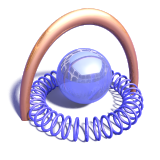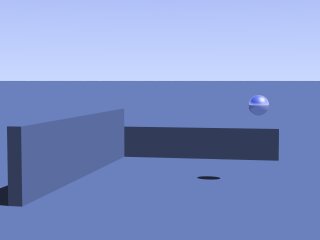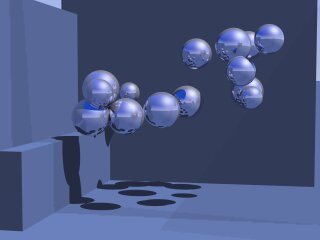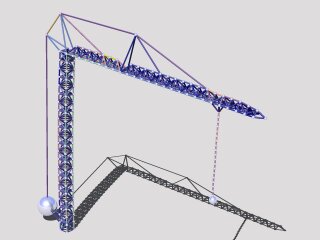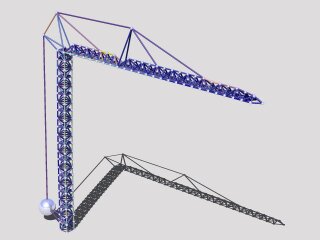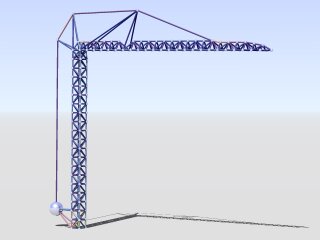Mechanics simulation experiments
In May/June 2002 i started some experiments simulating mechanical systems in POV-Ray. Here you can find a selection of animations i made during those experiments.
basic movement
more complex objects
|
Next i started implementing connections between the masses. With these simulating more complex structures is possible without much extending the simulation system. Friction turned out to be a critical aspect with such systems. In addition much more integration steps were necessary for the relatively stiff connections. The animation shows two small cubes, each made of 8 masses connected at the edges and the face diagonals. |
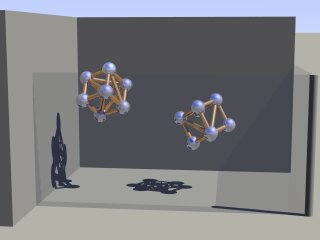
|
|
More complex geometries turned out to be very slow when simulated in POV-SDL. Here you can see a relatively soft larger cube deforming when hitting the ground. In addition to the elasticity also damping is simulated for the connections now. |
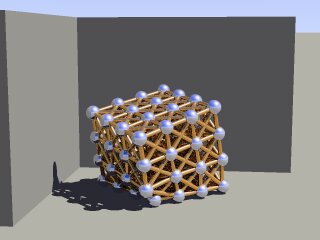
|
|
The environment collisions are meanwhile also modeled as elasticities. This is achieved
with help of the IsoCSG library and the
This animation shows a cube similar to the last one, but with solid faces and a more complex environment to interact with. Animation 5: solid cube interacting with more complex environment (mpeg, 320x240, 376k) |
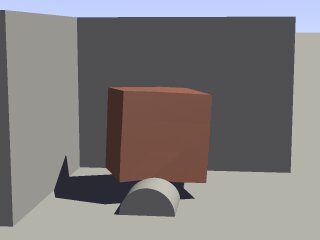
|
There are many possible geometries that can be simulated with such a system of masses connected through elasticities, here are a few more examples:
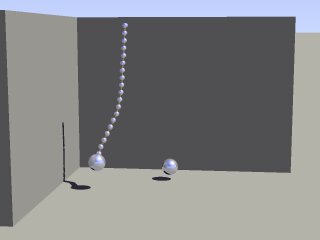
|
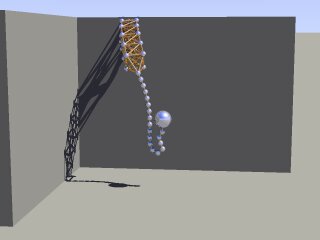
|
| Animation 6: solid cube interacting with more complex environment (mpeg, 320x240, 623k) | Animation 7: solid cube interacting with more complex environment (mpeg, 320x240, 623k) |
water interaction
I also made some tests with water interaction using a very simple yet effective method for generating water waves described in:
This method of course has it's limitations, especially when the waves are stronger. The following 2 animations show some of these problems.
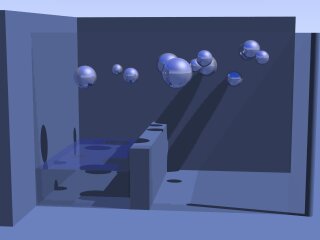
|
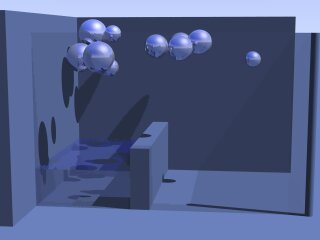
|
| water/ball interaction, slow motion 1:2 (mpeg, 320x240, 665k) | water/ball interaction with floating balls (mpeg, 320x240, 499k) |
Some further discussion of some of these simulations can be found on the povray.org newsserver:
Subject: balls simulation (665k) Date: Mon, 13 May 2002 00:09:01 +0200 Newsgroups: povray.binaries.animations From: Christoph Hormann <chris_hormann@gmx.de> news://news.povray.org/3CDEE7FD.B2EA955@gmx.de http://news.povray.org/3CDEE7FD.B2EA955@gmx.de
Subject: ball simulation 2 (2x500k) Date: Wed, 15 May 2002 18:51:08 +0200 Newsgroups: povray.binaries.animations From: Christoph Hormann <chris_hormann@gmx.de> news://news.povray.org/3CE291FC.E1C0909C@gmx.de http://news.povray.org/3CE291FC.E1C0909C@gmx.de
Subject: Balls connected (377+500k) Date: Thu, 30 May 2002 13:46:19 +0200 Newsgroups: povray.binaries.animations From: Christoph Hormann <chris_hormann@gmx.de> news://news.povray.org/3CF6110B.FF7822E7@gmx.de http://news.povray.org/3CF6110B.FF7822E7@gmx.de
Subject: balls 4x4x4 grid (249+198k) Date: Sun, 02 Jun 2002 11:40:02 +0200 Newsgroups: povray.binaries.animations From: Christoph Hormann <chris_hormann@gmx.de> news://news.povray.org/3CF9E7F2.777F427@gmx.de http://news.povray.org/3CF9E7F2.777F427@gmx.de
Subject: More Balls (623+376k) Date: Wed, 05 Jun 2002 12:13:54 +0200 Newsgroups: povray.binaries.animations From: Christoph Hormann <chris_hormann@gmx.de> news://news.povray.org/3CFDE462.AD6E8C74@gmx.de http://news.povray.org/3CFDE462.AD6E8C74@gmx.de
crane simulations
As part of a dynamics simulation course at university i also did some simulation on crane models. Here are two of them calculated with the POV-SDL based system like those above.
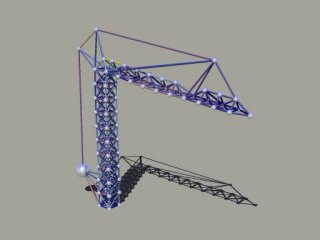
|
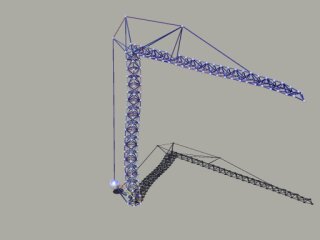
|
| Animation 8: small crane (mpeg, 512x384, 1246k) | Animation 9: larger crane collapsing under it's weight (mpeg, 512x384, 280k) |
The color of the connection represents the stress according to the following color map:

Apart from these i also made some simulations of more complicated crane models with a faster simulation system developed by the Institut für Dynamik und Schwingungen.


